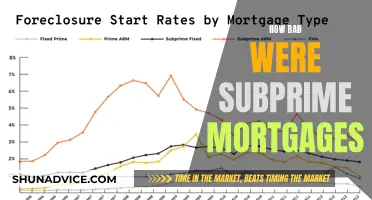
Mortgage-backed securities (MBS) are investments similar to bonds that are secured by a collection of mortgages. MBS are created by pooling together mortgages with similar characteristics, such as interest rates and maturity dates, and selling them to investors. The MBS market has grown significantly since the 2007-2008 financial crisis, which was largely triggered by the collapse of the subprime mortgage market and the complex web of MBS and related derivatives. Today, the MBS market is a major part of the global financial system, with a size of roughly $9 trillion and almost $300 billion in average daily trading volume. MBS are traded in a manner similar to Treasury bonds, with investors receiving payments based on the level of interest and principal made by consumers who obtained the mortgages. The calculation of the actual value of an MBS requires sophisticated mathematics due to the option of consumers to prepay a mortgage. MBS are subject to economic factors such as economic growth, inflation, and mortgage rates, which can impact their demand and price.
| Characteristics | Values |
|---|---|
| Type of security | Asset-backed security, similar to bonds |
| Issuers | Government-sponsored enterprises (GSEs), private financial companies, investment banks |
| Credit rating | Must be in the top two ratings issued by an accredited credit rating agency |
| Structure | Pass-through, collateralized mortgage obligation (CMO) |
| Maturity | Specific maturity date, but average life may be less |
| Taxation | The trust that sells pass-through MBS is taxed under grantor trust rules |
| Risk | Risk of default, monthly cash flow is not known in advance |
| Trading | Traded in a manner similar to Treasury bonds |
| Face value | Decreases over time |
| Trading volume | $300 billion in average daily trading volume |
What You'll Learn

Mortgage-backed securities are traded on the secondary market
Mortgage-backed securities (MBS) are investments like bonds. Each MBS is a share in a bundle of home loans and other real estate debt bought from the banks or government entities that issued them. MBS are asset-backed securities formed by pooling together mortgages. The investor who buys an MBS is essentially lending money to homebuyers.
MBS are traded on the secondary market. They are bought and sold through a broker, with the minimum investment varying between issuers. MBS are traded in a manner very similar to Treasury bonds. The size of the MBS market is roughly $9 trillion, with almost $300 billion in average daily trading volume. MBS prices are difficult and time-consuming to track, as there are countless websites, TV channels, newsletters, and other sources devoted to the stock and bond markets. Streaming real-time MBS pricing and related news is very hard to find and expensive.
There are two basic types of MBS: pass-through mortgage-backed security and collateralized mortgage obligation (CMO). The pass-through mortgage-backed security is the simplest MBS, structured as a trust, so that principal and interest payments are passed through to the investors. It comes with a specific maturity date, but the average life may be less than the stated maturity age. The trust that sells pass-through MBS is taxed under the grantor trust rules, which dictate that the holders of the pass-through certificates should be taxed as the direct owners of the trust apportioned to the certificate. Collateralized mortgage obligations comprise multiple pools of securities, also known as tranches. Each tranche comes with different maturities and priorities in the receipt of the principal and the interest. The tranches are also given separate credit ratings.
Trulia Mortgage Estimates: How Reliable Are They?
You may want to see also

They are bought and sold through brokers
Mortgage-backed securities (MBS) are investments similar to bonds. They are created by pooling together mortgages with similar characteristics, such as interest rates and maturity dates. These pools are then securitized and sold to investors, who essentially lend money to homebuyers. MBS can be bought and sold through brokers, with the minimum investment varying between issuers.
Brokers play a crucial role in facilitating the trading of MBS. They act as intermediaries, connecting buyers and sellers in the market. Investors who want to purchase MBS can approach brokers to find suitable opportunities that match their investment criteria. The brokers will have access to a network of sellers and MBS offerings, allowing them to present options that align with the investor's risk appetite, preferred maturity dates, and expected returns.
When buying MBS through a broker, investors should be aware of the associated costs. Brokers typically charge a commission, which is a fee for their services in executing the trade. This commission is usually calculated as a percentage of the total dollar amount of the trade. It's important for investors to understand the fee structure and any additional charges that may be incurred during the transaction.
Additionally, brokers can provide valuable insights and analysis to support investors' decision-making. They have access to real-time MBS pricing and market information, which can be challenging and costly for individual investors to obtain independently. Brokers closely monitor the MBS markets, keeping track of price changes, interest rate fluctuations, and news that can impact the value of MBS. This allows them to offer timely recommendations and help investors make more informed choices.
Selling MBS through a broker also offers advantages. Brokers can assist in finding potential buyers and facilitating the transaction process. They can provide guidance on pricing, taking into account factors such as discount points, coupon rates, and the prevailing economic conditions. By leveraging their network and relationships in the industry, brokers can connect sellers with interested buyers, ensuring a smoother and more efficient sale process.
Overall, brokers play a vital role in the trading of MBS by providing access to investment opportunities, market intelligence, and facilitating the connection between buyers and sellers. They help investors navigate the complexities of the MBS market and make more strategic decisions.
Bonds and Mortgage-Backed Securities: What's the Common Link?
You may want to see also

The MBS market has a daily trading volume of almost $300 billion
Mortgage-backed securities (MBS) are investments like bonds. Each MBS is a share in a bundle of home loans and other real estate debt bought from the banks or government entities that issued them. MBS are asset-backed securities formed by pooling together mortgages. The investor who buys an MBS is essentially lending money to homebuyers.
The MBS market has evolved significantly since the 2007-2008 financial crisis, which was largely triggered by the collapse of the subprime mortgage market and the complex web of MBS and related derivatives. Today, the MBS market remains a major part of the global financial system, albeit with new regulations and increased scrutiny from investors and policymakers. MBS are traded on the secondary market, enabling investors to profit from the mortgage business without the need to directly buy or sell home loans.
There are two basic types of MBS: pass-through MBS and collateralized mortgage obligation (CMO). The pass-through MBS is the simplest MBS, structured as a trust, so that principal and interest payments are passed through to the investors. CMO, on the other hand, is a more complex type of MBS composed of residential mortgages and tends to be sensitive to interest rate changes and economic conditions.
Understanding APR: The Mortgage Interest Rate Factor
You may want to see also

MBS are traded similarly to Treasury bonds
Mortgage-backed securities (MBS) are investments similar to bonds. Each MBS is a share in a bundle of home loans and other real estate debt bought from the banks or government entities that issued them. MBSs are traded on the market, with a total value of over $11 trillion in outstanding securities and an average daily trading volume of almost $300 billion in the US.
MBSs are traded similarly to Treasury bonds. MBSs are traded on the market, and investors can purchase shares of an MBS through exchange-traded funds (ETFs) on marketplaces such as iShares. ETFs are similar to mutual funds in that they offer investors a share of a professionally managed, diversified portfolio of stocks, bonds, and other assets, but they trade like stocks. Investors should be aware of how MBSs work before considering them as an investment, as they are a little less straightforward than investing in traditional bonds. MBSs are also considered a bit riskier than Treasury bonds, so investors need to have a higher-risk tolerance.
The MBS market has evolved significantly since the 2007-2008 financial crisis, which was largely triggered by the collapse of the subprime mortgage market and the complex web of MBS and related derivatives. Today, the MBS market remains a major part of the global financial system, with new regulations and increased scrutiny from investors and policymakers. MBSs are considered relatively low-risk, given the government backing for most of them. If an MBS is guaranteed by the federal government, investors do not have to absorb the costs of a borrower's default.
MBSs typically offer yields that are higher than government bonds. MBSs pay a fixed interest rate that is usually higher than US government bonds. They also typically offer monthly payouts, while bonds offer a single lump-sum payout at maturity. MBSs may be backed or issued by entities such as the Government National Mortgage Association (Ginnie Mae), the Federal Home Loan Mortgage Corporation (Freddie Mac), and the Federal National Mortgage Association (Fannie Mae).
Mortgage Ratings: Understanding the EMortgage Rating System
You may want to see also

MBS are pooled mortgages traded by Special Purpose Vehicles
Mortgage-backed securities (MBS) are investments that represent claims on the money generated by pools of mortgage loans. MBS are asset-backed securities formed by pooling together mortgages with similar characteristics, such as interest rates and maturity dates. These mortgage pools are securitised and then sold to investors. MBS investors receive periodic payments, including interest and principal repayments from the underlying mortgages.
MBS are often traded as to-be-announced (TBA) contracts, meaning that MBS are bought or sold on a specific date. The underlying mortgages are not known to the parties at the time of trading. MBS can be issued by government-sponsored enterprises (GSEs) like Fannie Mae, Freddie Mac, and Ginnie Mae, or by private financial institutions.
MBS are usually traded by Special Purpose Vehicles (SPVs). SPVs are the only legal aggregators of securities, according to the Reserve Bank of India. SPVs monitor and supervise repayments and dividends in connection with securities. They act as a bridge between investors and borrowers, offering mortgages to the public and then selling conforming mortgage loans at a discount to a central investment bank or government agency. The agency then pools similar mortgages into MBS and offers them for trade. SPVs collate similar loans and turn them into mortgage-backed securities for trading.
Applying for a Mortgage: A Step-by-Step Guide
You may want to see also
Frequently asked questions
Mortgage-backed securities (MBS) are investments like bonds. Each MBS consists of a bundle of home loans and other real estate debt bought from the banks that issued them.
MBS are formed by pooling together mortgages with similar characteristics, such as interest rates and maturity dates. These are then securitized and sold to investors.
MBS are traded in a manner very similar to Treasury bonds. MBS investors receive payments based on the level of interest and principal paid by the consumers who obtained the mortgages. MBS prices are influenced by economic growth and inflation.
MBS investors are exposed to the risk of default by the homeowners. MBS loaded with subprime loans played a central role in the 2007 financial crisis, which wiped out trillions of dollars in wealth.







